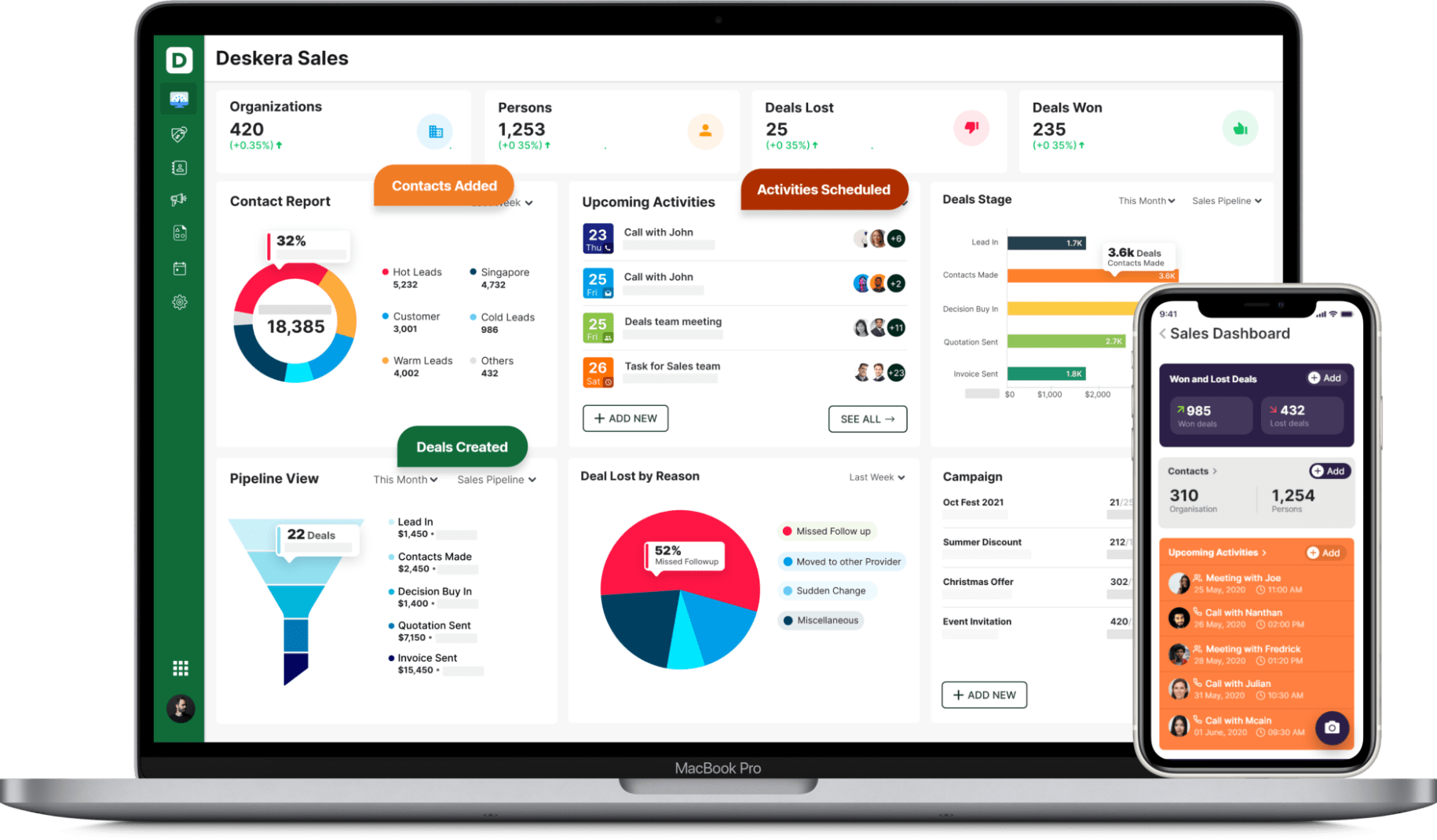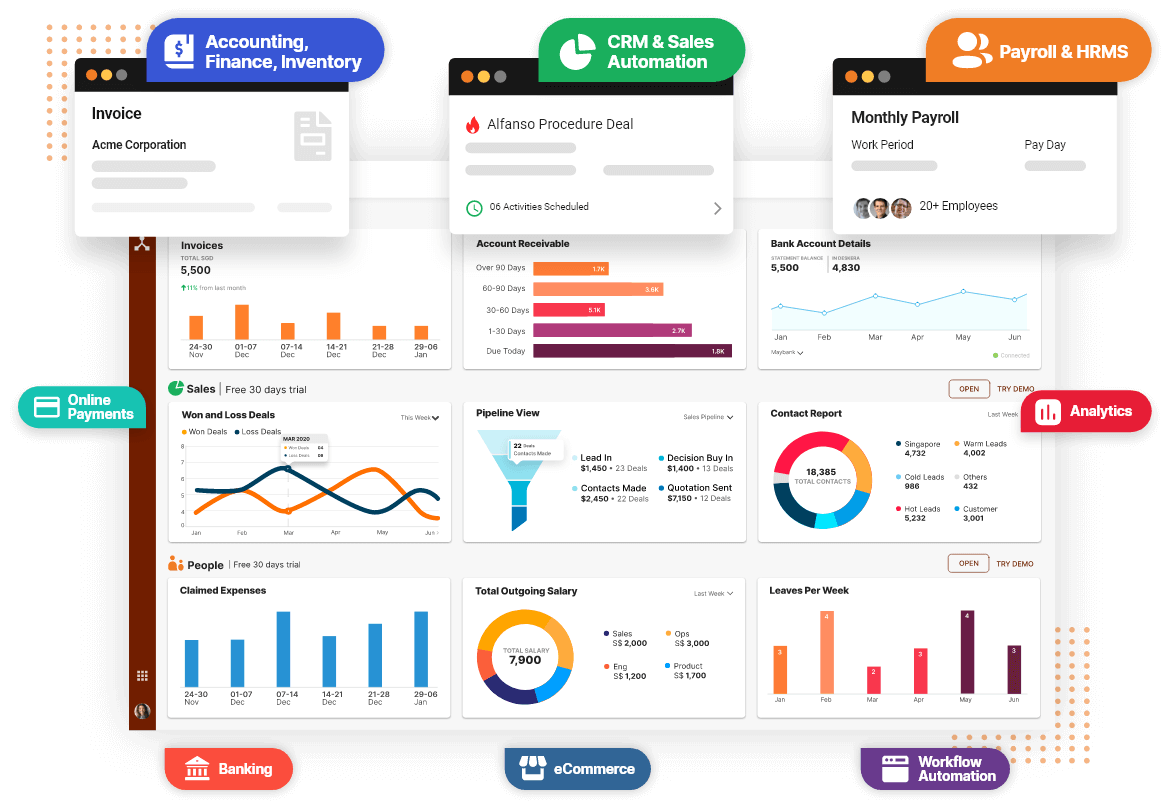Marketing KPIs (Key Performance Indicators) or Marketing Metrics are parameters that reflect the quality of a marketing plan. Marketing KPIs are numerical and specific marketing metrics that companies track to measure their progress towards a defined goal within their marketing channels.

Marketing KPIs help a company to improve its marketing efforts. The 9 important marketing KPIs include:
• Leads
• Sales
• Lifetime value of a customer
• Customer acquisition cost
• Revenue attribution & Conversion Rate
• Average Conversion Time
• Organic traffic
• Bounce rate
• Sales team response time
The digital world we live in today has made it impossible to run a business without an internet presence. Hence, companies need to use it to their advantage. There are many marketing software tools available today that have made it possible to track any and all marketing factors. KPIs help facilitate this by keeping a target or benchmark to measure success against.
KPIs or Key Performance Indicators are quantitative parameters used to keep your business in track. One can use them to evaluate the progress of a company. They also show the potential of current procedures and help set goals for future growth.
Developing KPIs takes careful planning and understanding. Companies should base them on their marketing and customer strategies. Each one needs to be tethered to specific goals for your business. The plan must be clear and establish relevant criteria.
The KPIs need to be achievable and needs to collect the necessary customer data and signals. It is necessary to see that the KPIs you decide on, aligns with the current priorities of the company and is part of your business plan. Each business is different, and they cannot all have the same KPIs. However, let us look at a few of the common KPIs widely used in enterprises.
Top Marketing KPIs for Your Business
In today's world, marketing is completely online and your business and marketing KPI needs to be focused on your online digital channels. Most businesses gain their customers online and even your revenue is generated online. E-commerce business has boomed in the last few years. Hence, for any e-commerce business, marketing KPI''s are curicial to understand.

Let us look at the top essential KPIs used for marketing in 2021 below:
1. Leads
Leads refer to potential/prospective customers. The number of leads acquired is proportional to sales opportunities and revenue conversions. The more leads you get into your marketing funnel, the more sales opportunities you have. With more number of leads, you have more sales opportunities and have better chances of sales growth. In e-commerce marketing, lead generation is always the sole aim for the marketing team.
Companies divide leads into Marketing Qualified Leads (MQLs) and Sales Qualified Leads (SQLs). An MQL is a lead that has a better chance of becoming a customer when compared to other leads. An SQL is a lead that merits a follow-up from the sales team because of its conversion potential. Companies also track Lead-to-MQL and MQL-to-SQL Ratios. They reflect how many of their leads are turning into conversions.

The cost per lead is the amount of money you spend to acquire a new lead. Hence, lead management is one of the crucial aspects of marketing KPI for every business.
Formula:
Cost Per Lead = Budget / Number of Leads
Example :
Budget = $250
Number of Leads =4
Cost Per Lead = $250/4 = $62.5
2. Sales
One of the main datasets a company already has access to is its sales revenues and the sales generated by your business. Having a sales KPI serves as a major marketing KPI because it reflects the success of the company's marketing plans. It also helps get rid of the strategies that aren't driving sales. Focusing on marketing KPI ensures that your business targets on increasing sales on a monthly basis.
You need to ensure that you can report your sales revenue, and your revenue exceeds the expenses or cost your marketing campaigns incur. At the end of the day, the best way to judge your marketing's success is by measuring its growth in sales revenue. Deciding to increase the sales revenue for the 3rd quarter by 10% is a sales KPI.

3. Lifetime Value of Customer (LTV)
The LTV metric indicates the net revenue a customer can bring into a company throughout their partnership. Customer lifetime value looks at how much revenue a business can reasonably expect over the average lifespan of a single customer.
We can calculate it by using the below formula:
LTV = Average Lifetime of a Customer * Average Purchase Amount * Average Number of Purchases in a Year
Average Lifetime = The duration of the customer-company relationship
Average Purchase Amount = The average amount they spend
Average Number of Purchases = The number of purchases with a year
For Example, If a customer makes an average purchase of $200 thrice a year, for a period of 10 years, their
LTV= 10 X $200 * 3 = $3000
The LTV marketing KPI can also help the company gauge its ROI (Return on Investment). The LTV let's you know what would be a good time to reach out to a customer to ensure they do not churn. It helps them reflect on how to reach out to their customers better. You can avoid customer churn by using better email marketing strategies to keep your customer engaged. It also helps increase your customer's lifetime value to the company.

4. Customer Acquisition Cost (CAC)
Companies use this metric to calculate the average amount they are investing in attracting every new customer. Cost per customer acquisition or CAC is the amount of money spent to acquire one customer. It measures the amount of money it takes to convert a potential lead into a customer.
We can calculate it by using the formula below:
CAC= Total Cost of Sales & Marketing/ Total Customers Acquired in that Duration
For Example, if a company spent $100 on sales & marketing in the 4th quarter and brought in 50 new customers,
4th quarter CAC = $100/50 = $2 per Customer
If the lifetime profit value of a customer is more than their CAC, the investment is successful. Acquiring a new customer is more expensive than customer retention.
5. Revenue Attribution and Conversion Rate
The traffic-to-lead ratio shows how much of the attracted traffic or website visitors translated to leads. This ratio reflects on the success of the company's marketing. The higher the ratio, the more the number of leads down the funnel and the higher the revenue generation.
Calculating the revenue from different marketing campaigns is important. The company should also know which medium or channel brought in the most customers.
This Marketing KPI helps the team decide where they need to focus their efforts. This is to ensure that they are not investing in mediums that are not generating proportional returns.
Companies define conversions as per their requirements. Sometimes a purchase order will count as a conversion. At other times, a client signing a five-year contract or a client joining the official mailing list qualifies as a conversion. Conversion rate is basically the ratio of a lead converting into a sale, which intern is bringing in the revenue.
6. Average Time for Conversion
This measures the duration between a customer becoming a client and their first interaction with the company. It reflects on whether the company's marketing strategies are clear. It also speaks to their influence in making a potential lead a customer.
Monitoring the amount of time for leads to convert into paying users shows the effectiveness of your companies sales process. If the conversion time is too long, your prospects might lose interest in your product or service, and you might end up losing them to a competitor.

7. Organic Traffic
Organic traffic refers to people visiting a website because they searched for it. The traffic that is not coming through paid channels and comes via searches on the internet is basically organic traffic. This Marketing KPI helps measure the Search Engine Optimization (SEO) efforts of the team. Keyword performance is very relevant for organic traffic.
The audience here is specific and has a goal they are looking to fulfill. If the company gives them what they were searching for, they will be open to becoming customers.
8. Bounce Rate
The Bounce Rate represents the percentage of visitors who visit a website but choose to leave it. It basically means people who bounce off your website page instead of exploring more or signing up.
We can calculate it is using the formula below:
Bounce Rate= (Single-page sessions / All visitor sessions) * 100
Single-page sessions = Visitors who only visited one page of the site
All visitor sessions = The total visitors that visited the website
For Example, if 200 people come to a website's homepage and 50 of them leave without exploring other pages.
Website Bounce Rate = (50/200)*100 = 25%

A high bounce rate indicates that visitors are leaving your website fast and are either not interested in your product or their attention is not being captured correctly. Average Session Duration and Average Pages per Session also show how long visitors are staying on the website. They also reflect their interaction levels.
9. Sales Team Response Time
It is well known that the interest of a potential customer reduces with time. Contacting a lead immediately has a higher probability of leading to a conversion. Hence, the speed of a sales team's response is important. Comparing your response time with competitors can also be helpful. You can consider outsourcing your customer service team to improve your response time efficiency. You can also look into customer service KPIs to improve your business performance further.
How Can Deskera CRM Help Your Business?
There are several softwares and services out there that can help your business and help you meet your marketing KPIs. We want to make sure you choose the right one for your business needs. If you are starting your own business and are unsure what to start with, our safest bet is to begin with Deskera CRM and set up your business end to end. They offer an easy-to-use platform with advanced segmentation and marketing funnels and multiple integrations with other parts of the enterprise. Deskera is affordable with multiple features and is highly recommended for its easy-to-use features and for starting off with your email marketing.
Deskera CRM is a simple, fully-featured platform that can help you with contact and deal administration, sales pipeline management, email marketing campaigns, to name a few. You can generate leads for your business by creating email campaigns and view performance with detailed analytics on open rates and click-through rates (CTR). Deskera CRM is an easy-to-use platform that will assist you in contact and deal management, sales pipeline, email marketing campaigns, customer support and ticketing management to mention the important ones.

Deskera is an all-in-one software that can overall help with your business to bring in more leads, manage customers and generate more revenue.

Key Takeaways
Marketing KPIs let the numbers reflect the status of the work. Companies need to track them often to reflect current statistics. They can be tracked in weekly, monthly, or quarterly periods depending on the specific KPIs.
In this article, we have gone through the top KPI's your company can look into:
• Leads
• Sales
• Lifetime value of a customer
• Customer acquisition cost
• Revenue attribution & Conversion Rate
• Average Conversion Time
• Organic traffic
• Bounce rate
• Sales team response time
Tracking website traffic & leads and social media reach & engagement are imperative. Collecting statistics from all platforms is also very important. Since it shows how each platform is performing. Goals like increasing revenue and customers are omnipresent for any business. Marketing KPIs play an important role in helping the company accomplish that. Hence, selecting the right KPIs to consider for your company is as important as using them at all.







